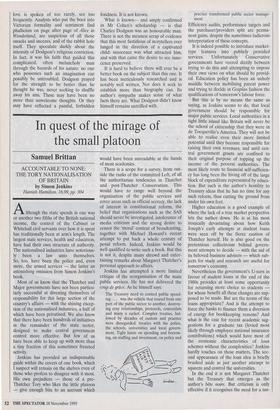In quest of the mirage of the small platoon
Samuel Brittan
ACCOUNTABLE TO NONE: THE TORY NATIONALISATION OF BRITAIN by Simon Jenkins Hamish Hamilton, 16.99, pp. 304 Although the state spends in one way or another two fifths of the British national income, the control of the Cabinet or Whitehall civil servants over how it is spent has traditionally been at arm's length. The largest state services, health and education, have had their own structure of authority. The nationalised industries have notorious- ly been a law unto themselves. So, too, have been the police and, even more, the armed services — the latter an astonishing omission from Simon Jenkins's book.
Most of us know that the Thatcher and Major governments have not been particu- larly successful at divesting themselves of responsibility for this large section of the country's affairs — with the shining excep- tion of the nationalised industries, a half of which have been privatised. We also know that there have been hundreds of initiatives in the remainder of the state sector, designed to make central government control more effective. But few of us have been able to keep up with more than a tiny fraction of this sometimes frenzied activity.
Jenkins has provided an indispensable guide within the covers of one book, which I suspect will remain on the shelves even of those who profess to disagree with it most. His own prejudices — those of a pre- Thatcher Tory who likes the little platoon — give enough bite to an account which would have been unreadable at the hands of most academics.
There is a scope for a survey, from out- side the ranks of the committed Left, of all the authoritarian tendencies in Thatcher and post-Thatcher Conservatism. This would have to range well beyond the organisation of the public services and cover areas such as official secrecy, the lack of interest in constitutional reform, the belief that organisations such as the SAS should never be investigated, intolerance of media criticism and the strong desire to censor the 'moral' content of broadcasting, together with Michael Howard's recent attempt to put back a whole century of penal reform. Indeed, Jenkins would be well qualified to write such a book. But this is not it, despite many shrewd and enter- taining remarks about Margaret Thatcher's personal approach to affairs.
Jenkins has attempted a more limited critique of the reorganisation of the main public services. He has not delivered the coup de grace. As he himself says:
The Treasury need to control public spend- ing .. . was the vehicle that roared from one part of the public sector to another, destroy- ing cosy relationships, protocols, concordats and many a racket. Complex treaties, hal- lowed by decades of custom and practice were disregarded: treaties with the police, the schools, universities and local govern- ment. Tight limits on spending and borrow- ing, on staffing and investment, on policy and practice transformed public sector manage- ment.
Efficiency audits, performance targets and the purchaser/providers split are perma- nent gains, despite the sometimes ludicrous interpretation of these concepts.
It is indeed possible to introduce market- type features into publicly provided services. Unfortunately Conservative governments have veered dizzily between trying to do this and attempting to impose their own views on what should be provid- ed. Education policy has been an unholy muddle between mobilising parent power and trying to decide in Gosplan fashion the qualifications of tomorrow's labour force.
But this is by no means the same as saying, as Jenkins seems to do, that local government should be responsible for major public services. Local authorities in a tight little island like Britain will never be the school of citizenship that they were in de Tocqueville's America. They will not be able to realise even their more limited potential until they become responsible for raising their own revenues, and until cen- tral government grants are confined to their original purpose of topping up the income of the poorest authorities, The most likely route to financial self-sufficien- cy has long been the hiving off of the large block of expenditure represented by educa- tion. But such is the author's hostility to Treasury ideas that he has no time for any such reform, thus cutting the ground from under his own feet.
Higher education is a good example of where the lack of a true market perspective lets the author down. He is at his most ironically devastating about how Keith Joseph's early attempts at student loans were seen off by the fierce caution of Thatcher herself. He is also good on the pretentious collectivism behind govern- ment attempts to decide — with the aid of its beloved business advisers — which sub- jects for study and research are useful for tomorrow's economy.
Nevertheless the government's U-turn in favour of student loans at the end of the 1980s provides at least some opportunity for returning more choice to students for whose benefit all these changes are sup- posed to be made, But are the terms of the loans appropriate? And is the attempt to force the banks to finance them a diversion of energy for bookkeeping reasons? And what is the case for recent academic sug- gestions for a graduate tax (levied most likely through employee national insurance contributions) which would have most of the economic characteristics of loan schemes without the complexities? Jenkins hardly touches on these matters. The sec- ond appearance of the loan idea is briefly brushed aside as just another attempt to squeeze and control the universities.
In the end it is not Margaret Thatcher but the Treasury that emerges as the author's bete noire. But criticism is only effective if it recognises the need for a tax- payers' watchdog. By identifying too easily with centuries' old childish gripes at the person who keeps the books, Jenkins has missed the opportunity for a better target: the Tory confusion between support for competitive markets as a social device and mistaken worship of businessmen, who are treated with exaggerated deference and expected to run much of the public sector in their spare time.
These harassed executives have brought with them the fashionable cult of macho management — delayering, downsizing and all the rest — which has now been let loose to weaken the Treasury itself. The main beneficiaries will be every lobby and quan- go in the land, which is hardly what was originally intended.



















































































 Previous page
Previous page